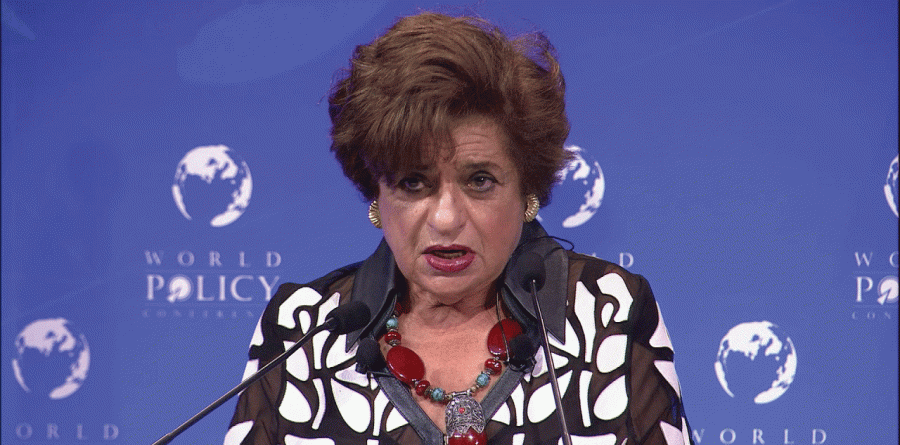Makram-Ebeid Discusses Women in Revolution
Politician and academic Mona Makram-Ebeid discussed Egyptian women and revolution, focusing mainly on the Egyptian Revolution in 2011 during a talk Wednesday, November 14.
Makram-Ebeid has served as a member of the Egyptian Senate and Parliament, President of the National Committee for Human Rights, adviser to the Supreme Council of the Armed Forces and in many other political roles, particularly pertaining to gender and human rights in Egypt. She is a Distinguished Lecturer in the Political Science Department at the American University in Cairo.
The lecture was sponsored by the Middle Eastern and Islamic Studies Program, the Political Science Department’s Kulla Lecture Fund and the Women’s Studies Program. Associate Professor of Political Science Bruce Rutherford introduced Makram-Ebeid and moderated the question and answer segment that followed Makram-Ebeid’s lecture.
Makram-Ebeid argued that the 2011 revolutions in Egypt, in which she herself participated in Tahrir Square, did not represent a real revolution of the patriarchal monopolization of private and public life, despite significant participation of women in the revolution.
“All talk to democracy is bulls— without equality with men…when will the bomb of Arab woman explode? I’m speaking here of her ability, her ambition, her liberty, strength and rights. The bomb of her anger at what is imposed on her and which she mostly accepts uncritically. The bomb of her self-confidence, that is the revolution we need,” Makram-Ebeid said. “We need women to have self-confidence that [they] can change, that this is the revolution we need and [this] is the revolution we deserve.”
Following the revolution, legislation that seemed to support women was simply for appearance, Makram-Ebeid said. She argued that problems still remained for women even after legal protections were put in place in Egypt because of the combination of Sharia and secular laws, which often contradict each other with regards to women’s rights. In addition, she said Islamist extremists pose a major threat to women’s success and freedom of expression.
“There remains a huge gap between the vision and reality. Why? Because the big debate is how to blend [Islamic] politics and respect for women’s rights,” Makram-Ebeid said.
Though current legislation is more favorable to women than ever before in Egypt, Makram-Ebeid said, unwritten laws and tradition still repress them.
“This strict code of conduct has its roots in the patriarchal culture…of the country,and exerts enormous influence on society. So, the mindset of patriarchy is still there,” Makram-Ebeid said.
The solution to this problem, Makram-Ebeid said, lies in education. An increase in average female education by just three years can lower fertility rates and increase female support of political change and ability to be independent.
“Promoting women’s rights because [it will] spur development and economic growth is a powerful way for the United States to advance its foreign policy in the future. The aid that the United States gives particularly to Egypt should be focused on education and particularly education of girls. Remembering that what women need… is a voice and a job.” Makram-Ebeid said. Sophomore Ally Kriss said Makram-Ebeid’s comments about women’s rights resonated with her. “Overall I thought she was [a] really interesting [speaker] and her take on women’s rights was pretty comprehensive and to the point,” Kriss said.
In addition to Wednesday’s lecture, Makram-Ebeid attended a lunch with students.
At the lunch, students had the opportunity to speak casually with Makram-Ebeid about Egyptian politicians and negative Western impressions of the Middle East.
First-year Kate Maro said a non-American perspective was fresh and insightful.
“It was interesting to hear a non-American politician comment on the way in which social prejudices make their way into politics and are thus perpetuated at a globally available scale,” Maro said.
First-year Ellie Lawrence said that Makram-Ebeid’s different areas of expertise made her arguments really rich.
“I thought it was interesting to hear from [Makram-Ebeid] as a politician and activist firsthand, and hear for ourselves how she approached different issues,” Lawrence said. “So much of what we hear about politics is filtered through the media and other people’s minds.”
Makram-Ebeid also discussed the book she recently wrote called “Daughters of the Night.” She asked all the students in attendance to take a photograph with her and the book at the end of the talk.
Contact Emily Rahhal at [email protected].
Emily Rahhal is a senior from Los Angeles, California double concentrating in Middle Eastern and Islamic Studies and Religion. She has previously worked...







